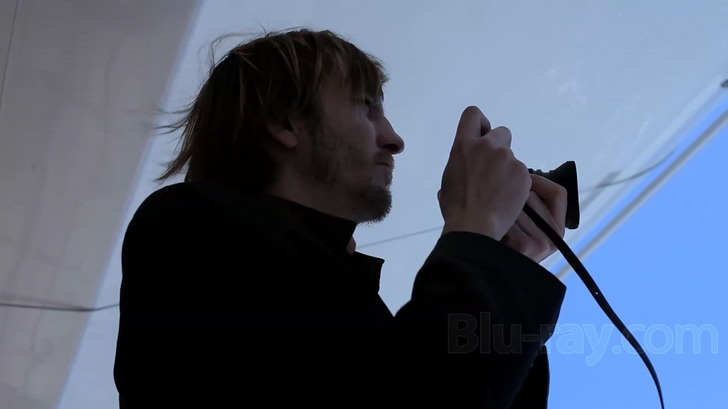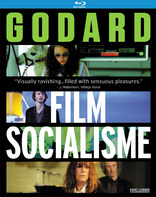Film Socialisme Blu-ray Movie
HomeFilm Socialisme Blu-ray Movie 
Kino Lorber | 2010 | 101 min | Unrated | Jan 10, 2012Movie rating
6.8 | / 10 |
Blu-ray rating
| Users | 0.0 | |
| Reviewer | 3.5 | |
| Overall | 3.5 |
Overview
Film Socialisme (2010)
A symphony in three movements. Things such as a Mediterranean cruise, numerous conversations, in numerous languages, between the passengers, almost all of whom are on holiday... Our Europe. At night, a sister and her younger brother have summoned their parents to appear before the court of their childhood. The children demand serious explanations of the themes of Liberty, Equality and Fraternity. Our humanities. Visits to six sites of true or false myths: Egypt, Palestine, Odessa, Hellas, Naples and Barcelona.
Starring: Jean-Marc StehlÚ, Agatha Couture, Mathias DomahidyDirector: Jean-Luc Godard
| Foreign | Uncertain |
| Drama | Uncertain |
Specifications
Video
Video codec: MPEG-4 AVC
Video resolution: 1080p
Aspect ratio: 1.78:1
Original aspect ratio: 1.78:1
Audio
French: DTS-HD Master Audio 5.1
Subtitles
English
Discs
50GB Blu-ray Disc
Single disc (1 BD)
Playback
Region A, B (C untested)
Review
Rating summary
| Movie | 4.0 | |
| Video | 4.0 | |
| Audio | 4.0 | |
| Extras | 0.5 | |
| Overall | 3.5 |
Film Socialisme Blu-ray Movie Review
A maddening political puzzle box.
Reviewed by Casey Broadwater January 5, 2012Nouvelle Vague pioneer Jean-Luc Godard, now 81, has had a 50-year career defined by cinematic provocation. His rule-
breaking debut, 1960's Breathless--with its hand-held camerawork, jump cuts, and documentary-like sense of
reportage--was an affront and direct challenge to the French film industry's "Tradition of Quality," which valued staid
craftsmanship and prestige over boundary-pushing innovation. Increasingly inscrutable and enigmatic, he's never quit
challenging convention, even to the point of contradicting and overruling his own previous god-like proclamations about the
art of film. (This is the man who said cinema is both "truth twenty-four times per second" and "the most beautiful fraud in the
world.")
Godard's artistic statements after 1967 tend to be multi-layered and not easily read, but his latest work, Film
Socialisme--which, at his age, could very well be his last--is arguably his densest, most opaque screed yet, an exhausting
visual essay on hegemony and history, globalization, YouTube, and the aimless state of a disparate, drifting Europe. Perhaps
the most divisive film at Cannes in 2010, it prompted both instant dismissals--most notably from BBC critic Mark Kermode,
who called it "a steaming pile of merde"--and the awed admiration of those happy to see Godard still spitting in the
face of the facile and expected.

Like all of Godard's "essay" films, Film Socialisme--billed as "a symphony in three movements"--is a segmented experience that covers a lot of ideological and historical ground. The first act is set on an ostentatious cruise ship, sailing between culturally important ports of call--Greece, Naples, Barcelona, Egypt, Palestine, and Odessa--where the nouveau riche passengers disembark for a few hours of superficial tourism before coming back on board to dance in gaudy discos, chow down at the always-open buffet, and peruse the ocean liner's "art" gallery. The "this is what we've come to?" surface metaphor isn't hard to grasp, but the more fertile subtexts are buried in a torrential information overload, with rapid- fire allusions to what Godard perceives as the defining issues of modern Western civilization, from the Israel/Palestine conflict to the sins of Europe's past and the potential for mutually-assured economic destruction. While this first section appears plotless at first, a narrative thread does eventually emerge. Hiding in plain sight among the cruise ship's oblivious, over-fed passengers are a former SS officer, a Russian detective, and a UN official, all looking for a bounty of gold that mysteriously disappeared during the Spanish Civil War, secreted away by stalinists and Nazis. It's an esoteric tale, told by a polymath (Godard), full of sound and fury, signifying--to put it as simply as possible--the twentieth century downfall of Europe at the hands of colonialists, fascists, and communists.
The twenty-first century takes a hit as well, specifically in regard to the way that global communication, in disseminating and democratizing knowledge of the world, has the unintended consequence of subjugating personal experience--why bother spending real time in a culture when you can read about it on the internet?--and devaluing language. In one scene, we see a teenaged girl, Alyssa, watching a YouTube clip of two cats "conversing" with one another in seemingly meaning-laden meows, and the very first shot in the film shows two talking parrots on a branch, the ultimate symbol of semiotic emptiness. There's definitely a deconstructionist slant here--if you look closely you'll notice that Jacques Derrida is name-checked in the opening credit sequence--and this pulling-apart of language extends to the subtitles, where Godard has opted to use "Navajo English," paring down the French and German dialogue to three or four essential key words. For example, the provocative line "AIDS is a tool to kill all Blacks on the continent" is rendered simply "AIDS tool killing Blacks." Yes, this does feel like a snobby gallic jab at English-speaking audiences, but it also fits Godard's ultra-fragmented aesthetic. (The Blu-ray and DVD releases, thankfully, contain both the "Navajo" subtitles and an optional full English translation.) There's visual and aural deconstruction at work too; while some scenes are shot in glossy high definition, others are filmed with cheap camcorders and even cellphones, the image and audio glitching and garbling into digital bits. Everything breaks down in the Information Age.
The second and third sections are slightly more easily followed, if no less crammed with references and ideas and snippets of philosophical discourse. Part two, "Quo Vadis Europa"--or, "Europe, where are you going?"--centers on the domestic disputes, business decisions, and political aspirations of the Martin family, who own a petrol station in the south of France. (Gas stations turn up often in Godard's films. I'm sure someone has already written a thesis about this.) While the father, Jean-Jacques, frets over selling the place, his wife and two precocious children--all three of whom are considering running for office--are being hounded by TV journalists looking for a scoop. In a film short on traditional narrative, these characters come closest to being dimensional, and there's also quite a lot of wry comedy here, like when the toe-headed young son, Lucien--a child prodigy who wears a communist t-shirt and paints Renoir reproductions from memory--stops to admire a female reporter's derriere. (His teenaged sister, Florine, is a firebrand who reads Balzac, refuses to give foreigners directions, and gets angry at anyone who uses conjugations of the verb form ŕtre, or "to be.") The abstract themes of part one--Europe's aimlessness and uncertainty--are distilled in the "Famille Martin," and there's also a more tangible connection to the cruise ship in the repeated image of a gold watch with no hands, a symbol that's open to any number of interpretations.
The final segment, Nos humanitÚs ("Our Humanities"), returns to the ocean liner and its trans-Mediterranean voyage, and here Godard creates audiovisual montage mini-essays for each stop on the itinerary, covering the concept of civil war in Greece and Spain, religious/political discord in Palestine, gold in Egypt, the Allied invasion of Naples during WWII, and the revolutionary significance of the "Odessa Steps," where Godard quotes from Sergei Eisenstein's agit-prop silent classic, Battleship Potemkin. Those familiar with the director's later work--especially his five-hour magnum opus Histoire(s) du cinÚma--will recognize Godard's technique of taking audio and video samples from other films and archival materials, chopping them up, and recontextualizing them, playing the images and sounds off of one another to create dissonance or synthesis of meaning.
Always one for Brechtian alienation, Godard never lets us get comfortable, and outright refuses to offer any explanations, let alone patient hand-holding. (He ends the film with a rather arrogant intertitle in all-caps: "NO COMMENT.") Film Socialisme is perhaps his most deliberate affront yet, and it's well-deserving of the controversy it's received. Yes, it's messy and willfully obtuse and sometimes almost entirely impenetrable, and yes, "unwatchable" is a term that gets bandied about in quite a few reviews. Fair enough. It is a film that gives little to, and requires much from its audience, practically necessitating repeat viewings, Internet sleuthing, and the skeleton key of critical analysis. However, if you put the effort in, and view them from the right angle, the fragmented, multi-faceted shards of thought in Film Socialisme coalesce into a surprisingly unified whole, a form-equals-content statement about the necessity of unity within a disparate, multi-cultural Europe.
Film Socialisme Blu-ray Movie, Video Quality 

Like the work itself, it's fruitless to attempt to "review" Film Socialisme's picture quality in the usual way. For most films, we assume that clarity and accurately reproduced color--whether realistic or stylized--are inherently part of the filmmakers' intent. But here, we're dealing with a visual essay of sorts that was shot on high definition video and the most lo-fi video imaginable--primitive cell phone footage--while featuring a variety of cobbled-together archival material, much of which looks like it's been duped directly from a VHS tape. The best I can say is that the 1080p/AVC-encoded Blu-ray presumably reproduces the source material faithfully, warts and all. And there are some serious warts. Even in the sections filmed natively in high definition, you'll notice frequent aliasing, ghosting, and shimmer, with a level of detail that's passable but hardly spectacular. Likewise, color is often oversaturated and underexposed, particularly in the second section of the film. There's even a scene where the video glitches and stutters and freezes while one character is telling a story. I thought this might've been a disc error until I read that Godard purposefully used a take where the camera malfunctioned. As for the various standard definition materials, they look as you'd expect--fuzzy, basically. And then there's the cell phone footage, which has a strange beauty in its pixilated, overamped harshness. Gaudy, headache-inducing, but occasionally arresting, the film is definitely a visual onslaught, and I get the feeling that even if the Blu-ray had some major encode or compression problems--which it doesn't--Godard wouldn't bat an eye. The medium is the message.
Film Socialisme Blu-ray Movie, Audio Quality 

Ditto for the film's DTS-HD Master Audio 5.1 surround track, a harsh, brittle mix that's unapologetic about the way it was recorded. For reasons inscrutable, Godard opted not to use a windscreen on his microphones, while also setting a high gain, resulting in crackly, popping, overdriven audio, especially on the cruise ship's deck. I actually wouldn't be surprised if he forewent boom or shotgun mics altogether, instead using whatever dinky microphone was built-in to the camera (or cell phone). The sound is almost always thin and bass-less, with highs that seem like they're about to shatter at any moment, although there are a few scenes where the bass is so overamped that all you can hear is a rumble of static. This, of course, is a wholly intentional decision, but audiophiles will cringe. This isn't a mix you'll want to listen to at a loud volume. What's surprising, though, since Godard is typically a mono kind of guy, is that Film Socialisme features surround sound, although the rear channels are really only used a few times to add ambience, off-screen voices, and music. The closest this track comes to "full" or "dynamic" is in the director's classical and operatic musical selections, which sound reasonably robust. Dialogue is at least comprehensible, if not always crystal clear. Do note that the disc includes Godard's original theatrical "Navajo English" subtitles and optional English subs with a full translation of everything that's said.
Film Socialisme Blu-ray Movie, Special Features and Extras 

In fitting with Godard's "NO COMMENT" end clause, there are no interviews, behind-the-scenes documentaries, or explanatory featurettes on the disc. All you'll find is a stills gallery with 19 photographs, and a collection of high definition trailers for Film Socialisme and other Kino releases. That said, inside the Blu-ray case you'll find a booklet with a 4-page essay by Richard Brody, author of Everything is Cinema: The Working Life of Jean-Luc Godard. It's an excellent primer, and reading it beforehand will definitely give you some assistance in parsing a film that isn't easily grasped the first time through.
Film Socialisme Blu-ray Movie, Overall Score and Recommendation 

Put away the popcorn and put on your thinking cap; Jean-Luc Godard's Film Socialisme isn't so much a movie as it is the cinematic equivalent of an essay that's been run through a paper shredder. If you want to understand it, you've got to piece it together yourself. Obviously, not everyone is up for this, but those who are will find Film Socialisme challenging and, hopefully, rewarding. Recommended for masochistic cinephiles, wannabe semioticians, and JLG apologists. You know who you are.
Similar titles
Similar titles you might also like

All About My Mother
Todo sobre mi madre
1999

White Material
2009

Of Gods and Men
Des hommes et des dieux
2010

Touki Bouki
1973

Stray Dogs
郊游 / Jiao you
2013

A Ship to India
Skepp till Indialand / A Ship Bound for India
1947

Soleil ď
Oh, Sun
1967

Memories of Underdevelopment
Memorias del subdesarrollo
1968

The Secret of the Grain
La graine et le mulet
2007

The Spirit of the Beehive
El espÝritu de la colmena
1973

The Moment of Truth
Il momento della veritÓ
1965

Zama
2017

Neighboring Sounds
O som ao redor
2012

Horse Money
Cavalo Dinheiro
2014

Transit
2018

I Wish
Miracle / 奇跡 | Kiseki
2011

Pain and Glory
Dolor y gloria
2019

Americano
2011

The Love of a Woman
L'amour d'une femme
1953

El Sur
1983
